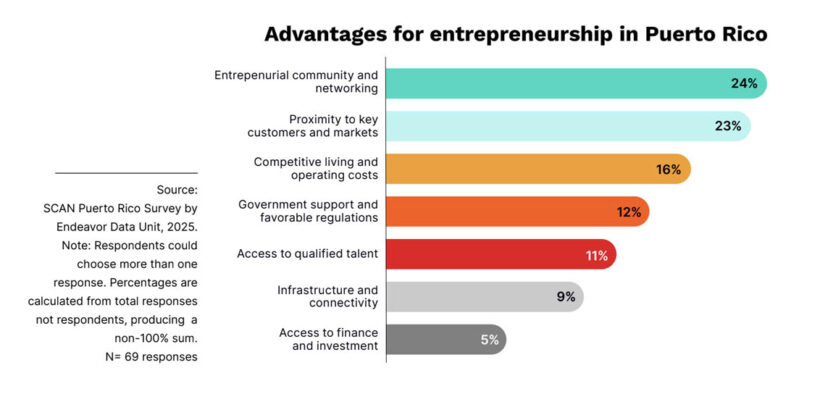Study: Puerto Rico startups surge despite capital limits

Puerto Rico’s entrepreneurship ecosystem is entering a new phase of transformation, according to Mastercard and Endeavor’s “2025 Ecosystem Scan: Catalyzing Entrepreneurship and Innovation in Puerto Rico” study.
The report describes an island in motion, where creativity, resilience and policy incentives are reshaping a once-budding startup community into a growing engine of economic activity.
“Puerto Rico stands at a defining moment,” the report says, noting that the island “has demonstrated extraordinary resilience and creativity, positioning the island as a rising innovation hub in the Americas.”
The study mapped more than 500 active startups and surveyed 69 high-growth ventures to measure the evolution of the local innovation scene. Between 2022 and 2024, Puerto Rican startups reported strong revenue growth, with median income increasing from $75,000 to $500,000 and average revenue reaching $1.45 million.
Mastercard said the trend reflects “broader financial sustainability and top-tier performance.”
Despite growth, access to capital remains the leading barrier to scale. Forty-five percent of entrepreneurs described it as a “major or critical challenge,” and nearly four in 10 said they have never obtained external financing.
“Puerto Rico’s biggest challenge is the lack of formal venture capital,” said Parallel18 Executive Director Héctor Jirau, noting that venture fund assets have remained flat at about $74 million since 2021.
The decline in traditional banking has compounded the problem: the number of Federal Deposit Insurance Corp.-insured banks operating in Puerto Rico has fallen from 10 in 2009 to three by 2022.
The island’s human capital shows both strength and strain. While 63% of founders had C-suite experience before launching their ventures, six in 10 startups report difficulty hiring technical talent. Software developers and business-development professionals are the hardest to recruit, a reflection of Puerto Rico’s ongoing brain drain.
“Talent remains Puerto Rico’s greatest challenge — and greatest opportunity,” said Abarca Health CEO Jason Borschow. “If we create the right conditions, we can inspire people to return, contribute and lead.”
Startups have shown agility through repeated crises. Following Hurricane María and the COVID-19 pandemic, ventures such as BrainHi, Raincoat and Uva! emerged to meet new demands, from telehealth automation to AI-powered customer service.
Uva! co-founder Laura Tirado said AI “has allowed us to operate much leaner by automating many repetitive processes.” That efficiency has become critical as 56% of entrepreneurs cite rising costs as their top concern, she said.
Policy, ecosystem support
Puerto Rico’s U.S. jurisdictional status, dollarized economy and bilingual workforce continue to attract founders and investors. Acts 20, 22 and 60 provide incentives including a 4% fixed corporate tax rate, full capital-gains exemptions and 50% transferable R&D credits, policies that have “produced more than 100,000 jobs and generated around $1 billion in net revenue for the government,” according to the Department of Economic Development and Commerce, cited in the report.
Fintech and information-technology startups make up about 25% of the ecosystem. Growth, the report notes, is driven less by financing and more by innovation: founders identified creativity and strategic partnerships as the main sources of expansion.
Accelerators such as Parallel18 and Grupo Guayacán remain key intermediaries, with 46% of startups receiving support from incubators. Mastercard and Endeavor describe the ecosystem as “high-touch,” noting that 82% of founders have received mentorship, one of the highest rates in Latin America.
The study highlights community and proximity to markets as Puerto Rico’s greatest advantages, with 24% of founders citing the island’s entrepreneurial network as their biggest strength. The diaspora’s involvement in mentorship and investment is also expanding.
“The Puerto Rican diaspora in Silicon Valley has been an invaluable asset to us,” said BrainHi co-founder Emmanuel Oquendo.
The Mastercard–Endeavor study frames Puerto Rico as a potential testbed for scaling innovation across the Americas. With more than $1 billion allocated for broadband expansion and a goal of 100% renewable energy by 2050, the island’s digital and energy transitions could further accelerate entrepreneurship.
“Together, we can build a more inclusive, innovative and sustainable future for Puerto Rico,” Mastercard’s foreword concludes — describing a vision of resilience evolving into long-term prosperity.




